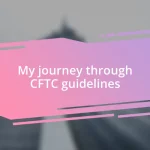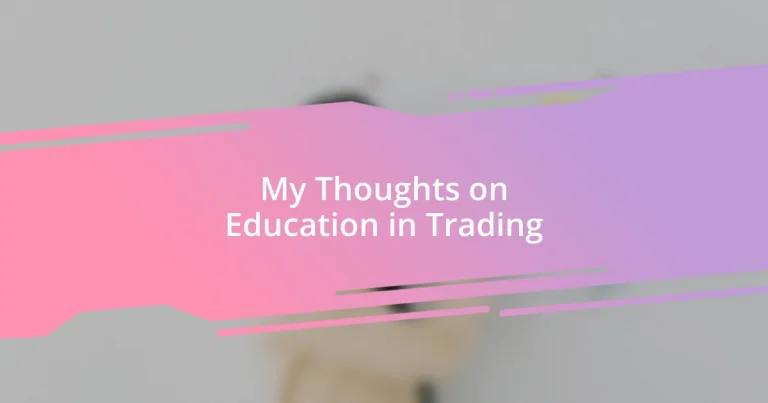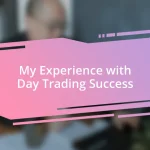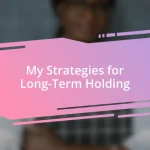Key takeaways:
- Emotional resilience is crucial in trading; understanding and managing emotions can significantly impact decision-making.
- Fostering practical skills, such as risk management and market analysis, is essential for success; theoretical knowledge alone is insufficient.
- Continuous self-evaluation and reflection on trading experiences lead to growth, allowing traders to adapt and improve their strategies.
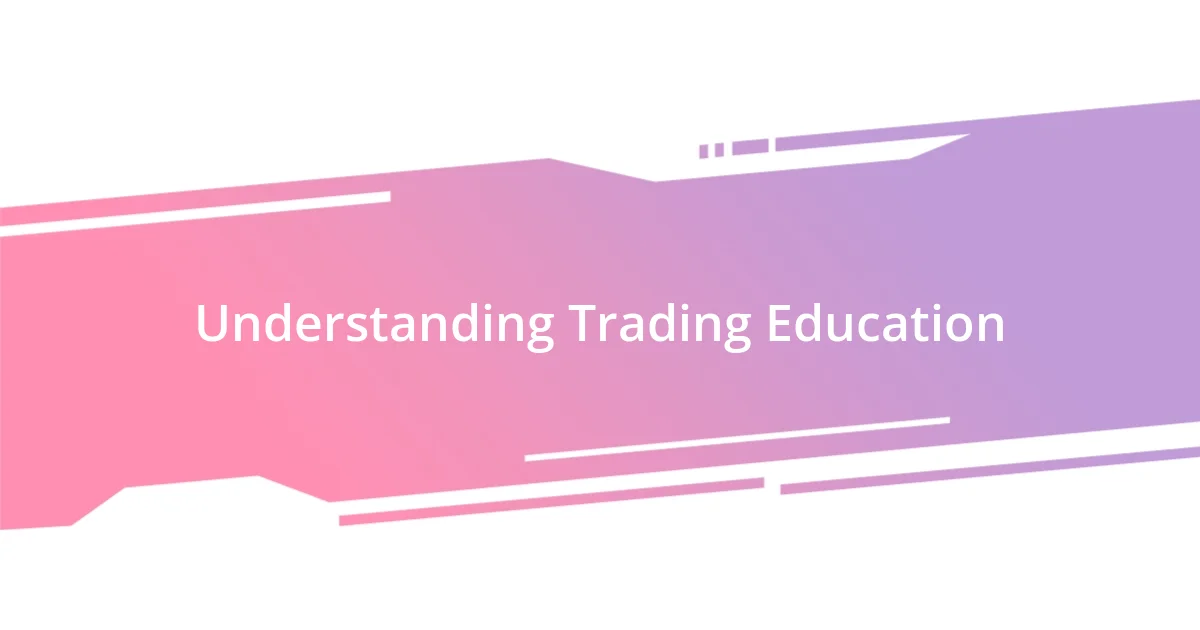
Understanding Trading Education
Trading education is a nuanced field that goes beyond just the numbers and charts; it’s a blend of psychology, strategy, and market understanding. From my experience, many new traders often underestimate the emotional rollercoaster that trading presents. Have you ever felt a rush of excitement when a trade goes your way, only to feel crushed by a sudden downturn? That emotional volatility is something formal education often overlooks but is crucial for long-term success.
In my early trading days, I enrolled in a course that promised to teach me the ins and outs of the market. What struck me most was the realization that the concepts, while important, needed to be paired with practical application. The difference between theoretical knowledge and actual trading is sometimes stark; how can someone truly learn without experiencing the highs and lows firsthand? Engaging with a mentor or a community can bridge that gap, providing insights that self-study might miss.
When delving into trading education, I believe it’s essential to seek out resources that prioritize practical skills and emotional resilience. The market doesn’t just test your knowledge; it tests your mindset. Have you ever taken a moment to reflect on how your mindset influences your decision-making? Personally, I found that cultivating a reflective practice helped me navigate the complexities of trading much more effectively.
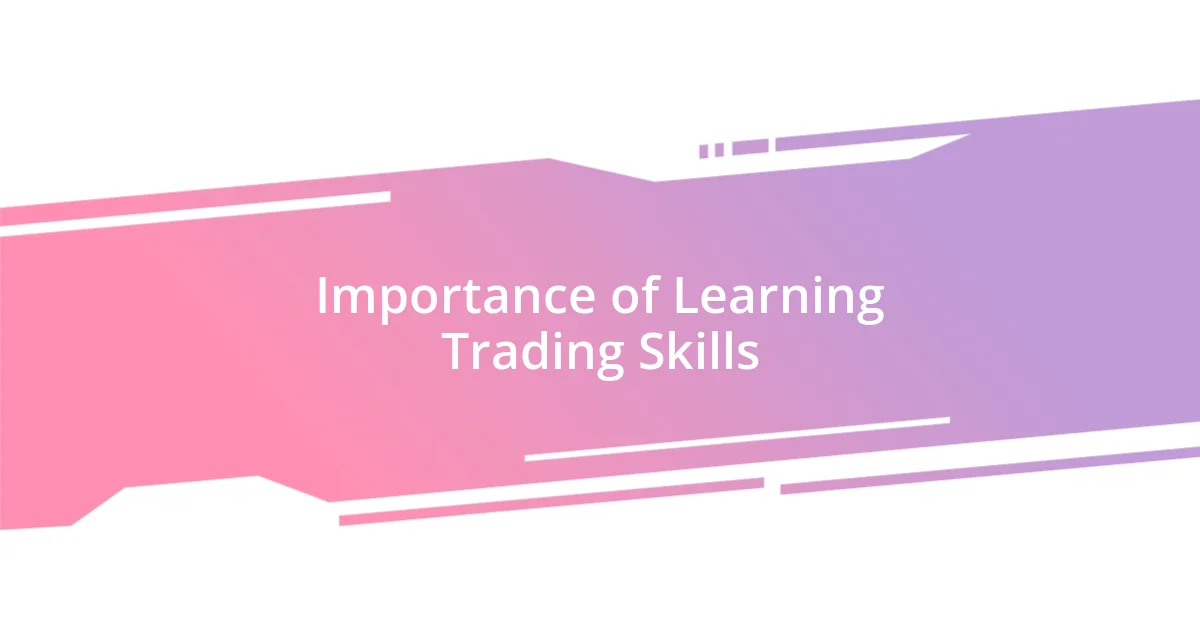
Importance of Learning Trading Skills
Learning trading skills is essential for anyone looking to succeed in the fast-paced world of finance. I can’t stress enough how vital it is to acquire the right tools and techniques. I remember when I first attempted to trade on gut instinct, thinking I’d make a fortune overnight. It only took a couple of losses for me to realize that without a solid skill set, my chances of success dwindled significantly. Trading isn’t just about luck; it’s about applying what you’ve learned and adapting to various market conditions.
Here are several key reasons why learning trading skills is crucial:
- Risk Management: Understanding how to protect your capital can be the difference between surviving and thriving in trading.
- Market Analysis: It’s essential to analyze market trends and indicators to make informed decisions.
- Emotional Control: Developing emotional resilience helps in managing stress and avoiding impulsive decisions.
- Strategic Thinking: A well-planned strategy guides trades and fosters discipline, promoting long-term success.
- Building Confidence: Mastering trading skills boosts your confidence, allowing you to make decisions more effectively.
Each of these skills plays a integral role in fostering a successful trading journey. Reflecting back, I’ve come to appreciate that education in trading is not merely an asset but a necessity.
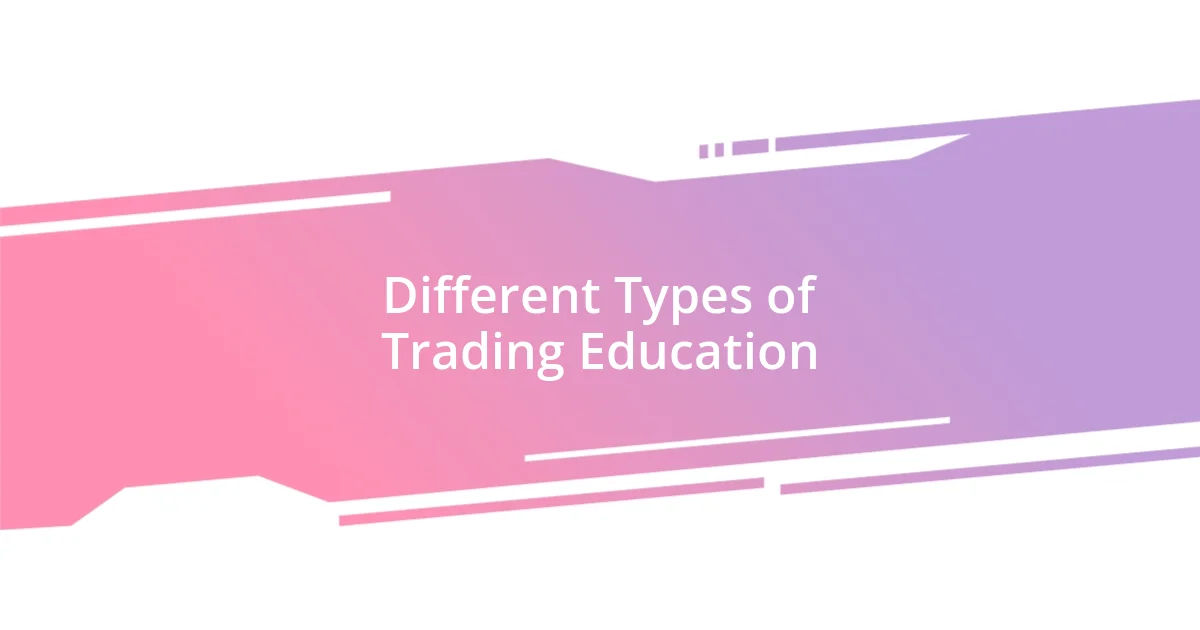
Different Types of Trading Education
Different types of trading education cater to a range of learning styles and needs. I’ve encountered various approaches, from structured courses to informal mentorship. Each method has its strengths and weaknesses. For instance, online courses can offer great flexibility, but they may lack the personal touch found in live sessions or one-on-one mentoring. Do you prefer learning at your own pace or asking questions in real-time? Personally, I cherish the conversations with mentors who not only teach strategies but also share their own experiences. Their insights often reveal nuances that standard courses gloss over.
Self-study is another popular path, allowing traders to dive deep into topics at their own pace. However, I’ve found that too much isolation can sometimes stifle progress. When I hit a wall during a self-study phase, reaching out to trading forums or local meetups helped rejuvenate my enthusiasm. The exchange of ideas with others in the trading community is invaluable and often sparks new insights. Have you ever felt stuck in your trading journey? I truly believe that collaborating with fellow traders can ignite a fresh perspective, which is often what we need to keep moving forward.
Here’s a simple comparison of different educational approaches to trading:
| Type of Education | Pros | Cons |
|---|---|---|
| Online Courses | Flexible schedule, structured learning | Limited interaction |
| Mentorship | Personalized guidance, emotional insights | Can be expensive, availability issues |
| Self-Study | Self-paced, potentially lower cost | Lack of accountability and support |
| Local Meetups | Networking opportunities, real-time discussion | Time and location dependent |
This table illustrates how each education type serves different needs. It’s crucial to find a balance that works for you, creating a personalized education path that incorporates both knowledge and emotional intelligence.
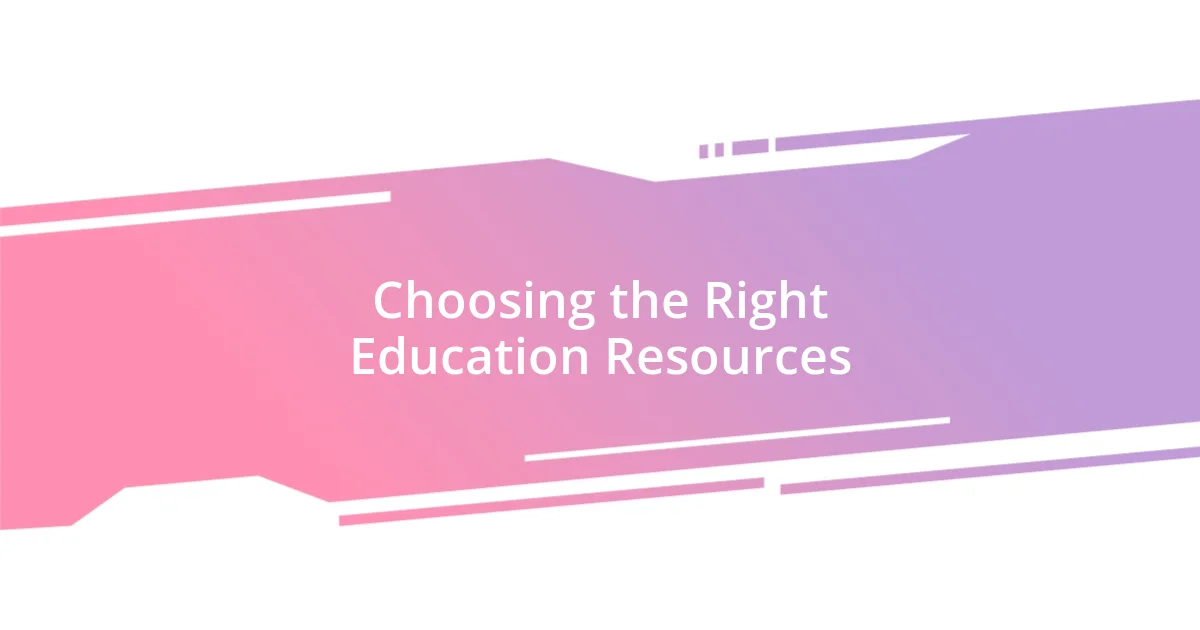
Choosing the Right Education Resources
Choosing the right educational resources in trading can feel overwhelming at first. I recall scouring the internet for credible courses, only to feel lost in a sea of options. It’s essential to look for educators with proven track records, as the quality of instruction can significantly impact your learning curve. Have you ever taken a course only to find it lacking depth? I certainly have, which is why I prioritize resources that not only cover strategies but also delve into the psychology behind trading decisions.
When exploring various materials, consider your own learning preferences. For example, I thrive on interactive learning experiences, so I gravitate towards webinars and live classes. They offer the chance to ask questions and receive feedback in real-time, making the learning process much more engaging. Conversely, I’ve also tried books—some provided solid foundational knowledge, while others felt more like filler. What works best for you? Reflecting on your experiences will guide you in selecting resources that truly resonate with your style.
Lastly, don’t underestimate the power of community in your educational journey. I’ve found immense value in online trading forums, where sharing experiences helps demystify complex concepts. Engaging in discussions and exchanging ideas has often been the catalyst for my breakthroughs. Have you participated in forums or groups? It’s amazing how collaboration can enhance understanding and provide new perspectives on trading strategies.
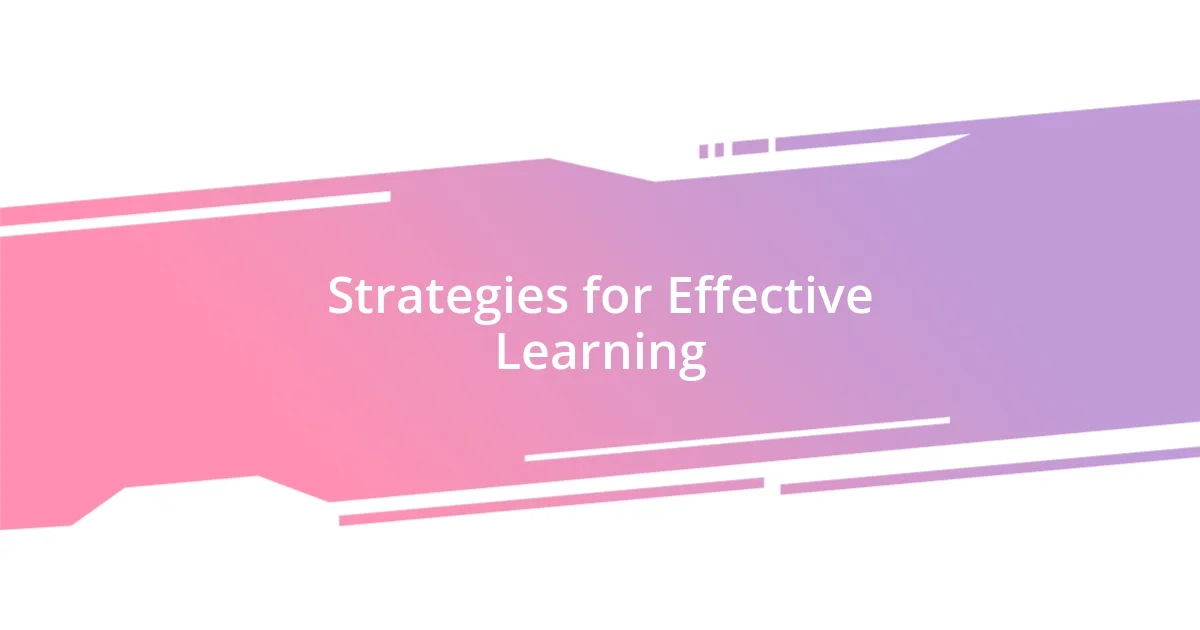
Strategies for Effective Learning
Engaging with various learning strategies can transform your education in trading. I remember when I first started, I jumped headfirst into a plethora of YouTube tutorials. While some videos were insightful, others left me confused and overwhelmed. It taught me that curating my learning materials is crucial. Have you ever felt that a source just didn’t click? Filtering through resources is necessary for effective learning because quality matters more than quantity.
I’ve also discovered the importance of active learning techniques. Instead of just passively reading or watching, I recommend practicing what I’ve learned using demo accounts. This hands-on approach has allowed me to apply concepts in real-time, translating theory into practice. I still vividly recall my initial attempts at backtesting strategies; the thrill of seeing numbers align with my expectations was incredibly rewarding. Have you ever tried something that sounded daunting but ended up being exciting? Embracing these opportunities can deepen your understanding and build confidence.
Lastly, setting clear, achievable goals has made a world of difference in my learning journey. For instance, I once took on the challenge of mastering a specific trading strategy in one month. I broke it down into daily tasks, and every small victory felt like a stepping stone to success. I vividly remember sneaking in an extra hour of study late at night just to grasp a tricky concept. What goals have you set for yourself? Finding that motivational spark can be crucial, as it gives your learning a sense of purpose and direction.
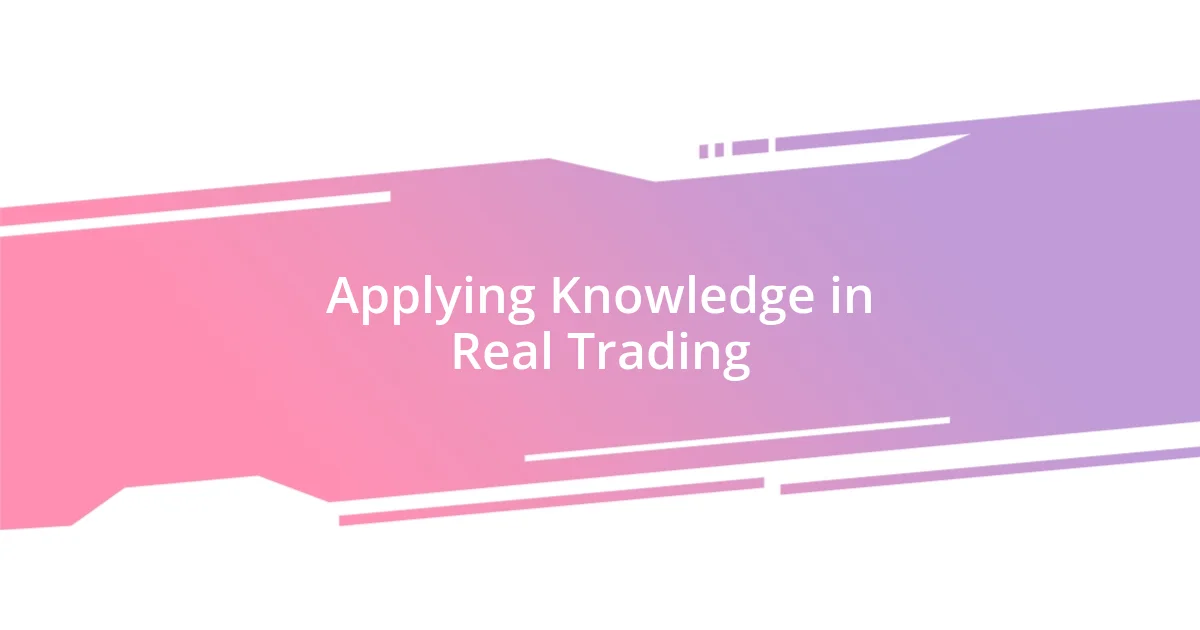
Applying Knowledge in Real Trading
Applying knowledge in real trading is where the rubber meets the road. I’ll never forget my first live trade. I had meticulously studied chart patterns, yet the moment I pressed that ‘buy’ button, I felt a mix of exhilaration and anxiety. My heart raced as I watched the price tick up and down, testing my understanding of the strategies I had learned. It was eye-opening; theory is one thing, but the emotional pressure during real trading can shift your perspective entirely. Have you ever experienced that jolt of reality when applying what you’ve studied?
There’s also something to be said about adapting your strategies to real-world conditions. I learned quickly that markets don’t always behave as textbooks say they should. There was a time when I relied heavily on indicators, only to realize that they didn’t always capture the nuance of market sentiment. After a few losses, I began to listen to market news and observe broader economic trends, allowing my trades to become more flexible and responsive. How about you? Have you found moments where your market analysis didn’t align with what you expected? Those moments can be painful but ultimately teach you invaluable lessons.
As I reflect on my trading journey, I’ve come to understand the significance of patience. In my eagerness to implement my newfound skills, I often rushed into trades, hoping to capture quick profits. It took some costly mistakes before I learned that waiting for the right setup is crucial. I began to appreciate the beauty of a well-timed entry rather than just being active in the market. When have you felt the weight of impatience? It’s in those quiet moments of waiting that I’ve often found my greatest insights about strategy and market behavior.
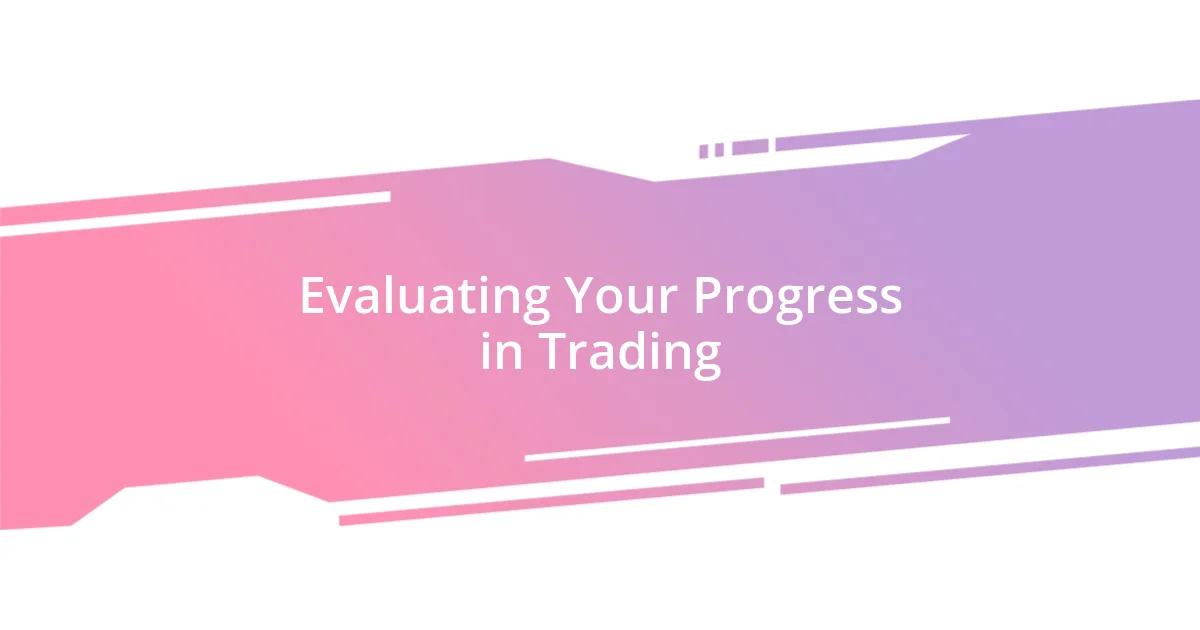
Evaluating Your Progress in Trading
Evaluating your progress in trading isn’t just about analyzing your profits and losses; it’s a holistic reflection on your growth as a trader. I remember the moment I started keeping a trading journal. I poured over my trades, noting not only the results but also my thoughts and emotions during each decision. Have you ever taken the time to reflect on why you entered a trade? It was enlightening to see patterns in my behavior, something I wouldn’t have noticed if I hadn’t documented my journey.
Tracking your progress can also mean setting specific benchmarks to see how far you’ve come. For example, I used to measure my improvement by aiming for smaller, consistent wins rather than chasing that elusive big score. The day I realized my win rate had been steadily increasing was a huge milestone. How do you assess your own benchmarks? Each small win built my confidence and reinforced the notion that persistence and discipline are key to becoming a better trader.
Ultimately, I learned that self-evaluation is a continual process. Periodically reviewing my trades helped me identify not only what worked but also the mistakes I needed to correct. I still recall the relief I felt after recognizing a faulty strategy—addressing it early saved me from bigger losses. What do you do to ensure you’re progressing? Engaging in this consistent self-assessment creates a cycle of improvement, helping you evolve in your trading practice.









